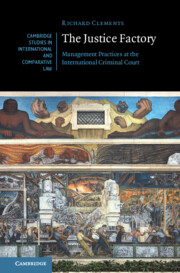Book contents
- The Justice Factory
- Cambridge Studies in International and Comparative Law: 182
- The Justice Factory
- Copyright page
- Contents
- Figures
- Acknowledgements
- Abbreviations
- 1 Introduction
- 2 A History of the International Criminal Court’s Managerial Present
- 3 The Managerial Court
- 4 The ICC Expert
- 5 ICC Legal Argumentation
- 6 ‘In a Technical and Political View’
- 7 Conclusion
- Select Bibliography
- Index
- Cambridge Studies in International and Comparative Law
1 - Introduction
Published online by Cambridge University Press: 01 December 2023
- The Justice Factory
- Cambridge Studies in International and Comparative Law: 182
- The Justice Factory
- Copyright page
- Contents
- Figures
- Acknowledgements
- Abbreviations
- 1 Introduction
- 2 A History of the International Criminal Court’s Managerial Present
- 3 The Managerial Court
- 4 The ICC Expert
- 5 ICC Legal Argumentation
- 6 ‘In a Technical and Political View’
- 7 Conclusion
- Select Bibliography
- Index
- Cambridge Studies in International and Comparative Law
Summary
Practitioners and scholars of the International Criminal Court are now bilingual: they speak the familiar language of anti-impunity, justice, and mass violence alongside the more unfamiliar but no less language of strategic planning, audit, appraisal, and optimisation. But how has it happened that such management language now finds a home in this primary institution of global justice? This introductory chapter begins to answer this question by introducing international (criminal) lawyers to management as an expert practice, before positioning the phenomenon within the wider dispositif of the International Criminal Court. The chapter further brings the study of management to international lawyers by offering four axioms of expertise that guide the book’s approach to both international law and management expertise. After briefly outlining the key arguments, the introduction provides an outline of the chapters and a note on the book’s stylistic choices.
Keywords
- Type
- Chapter
- Information
- The Justice FactoryManagement Practices at the International Criminal Court, pp. 1 - 36Publisher: Cambridge University PressPrint publication year: 2024



